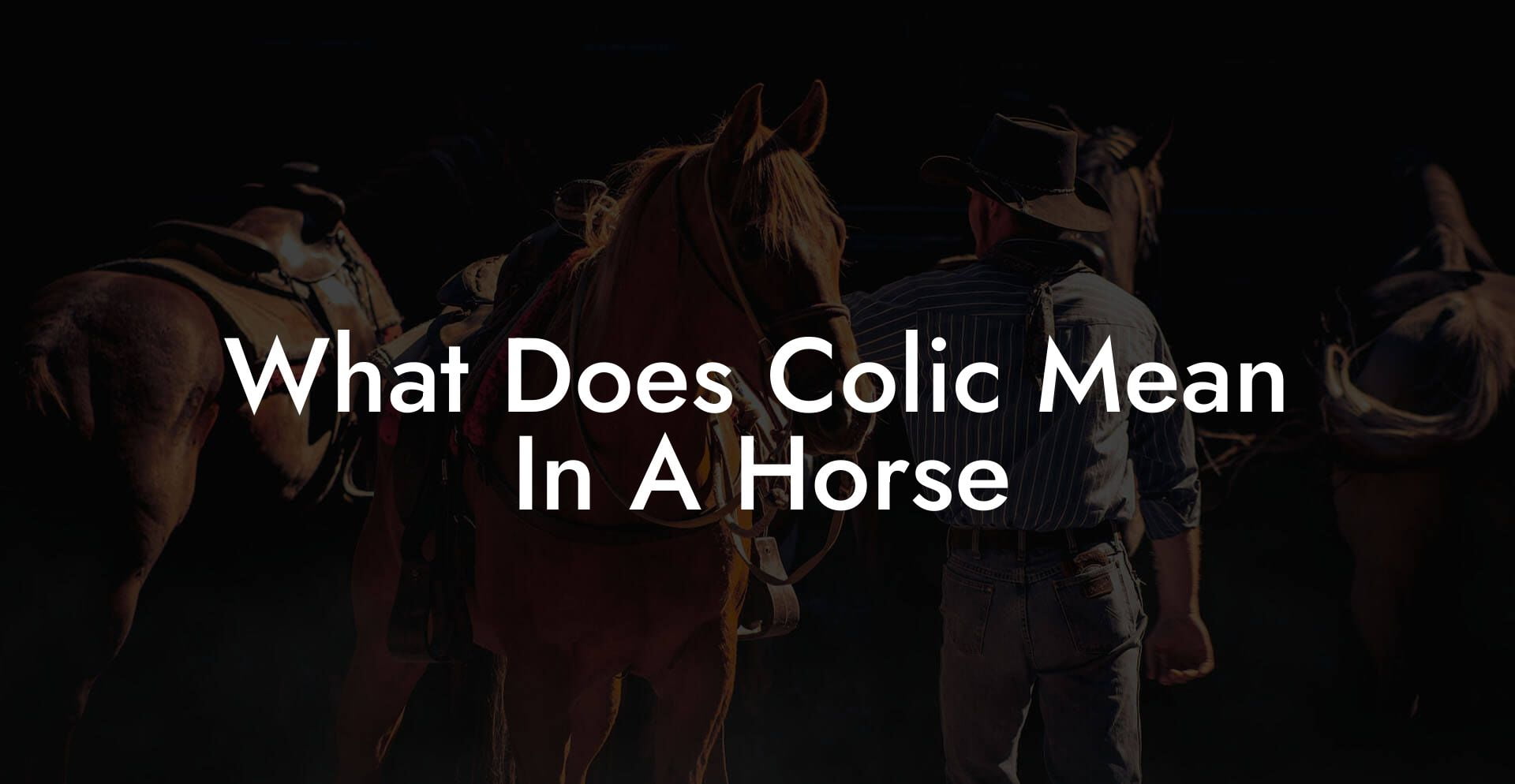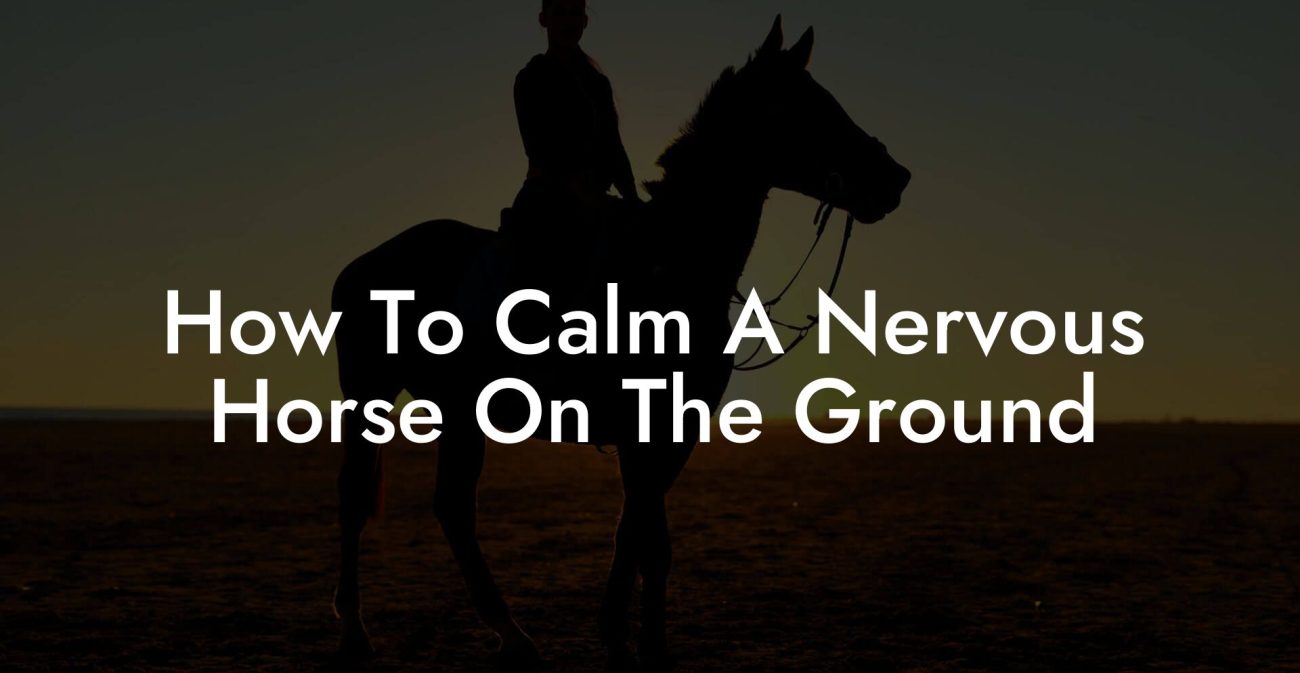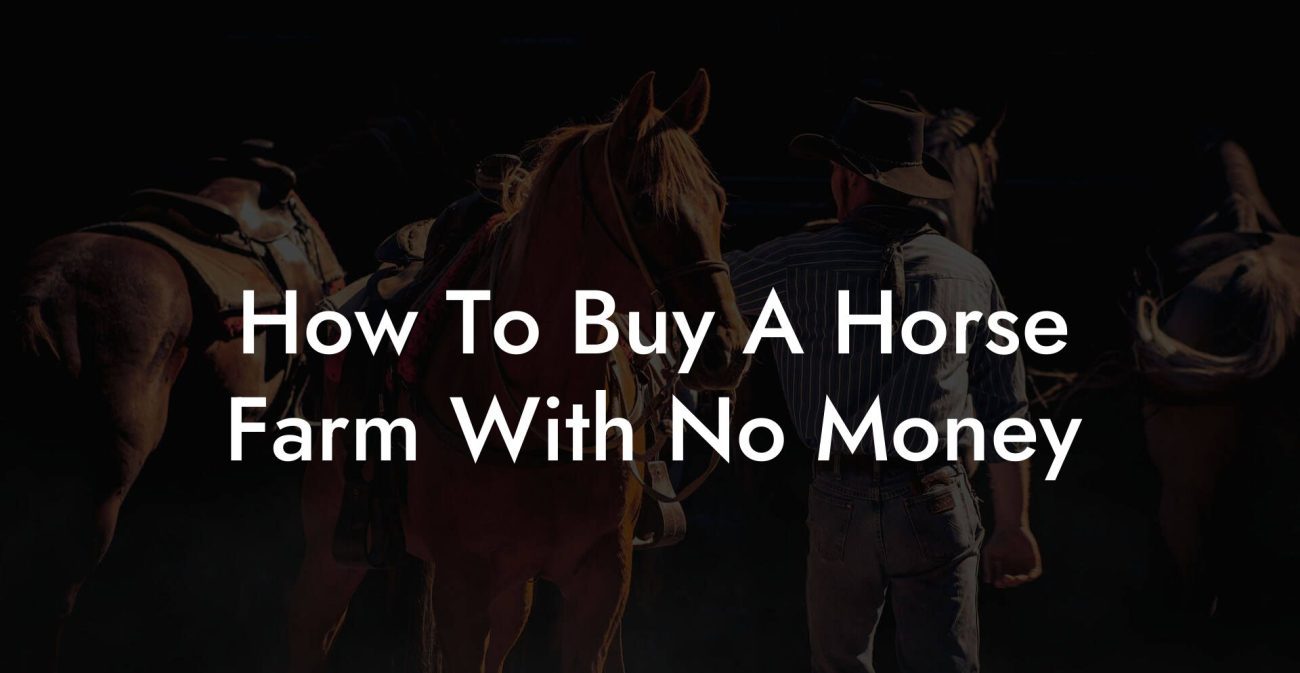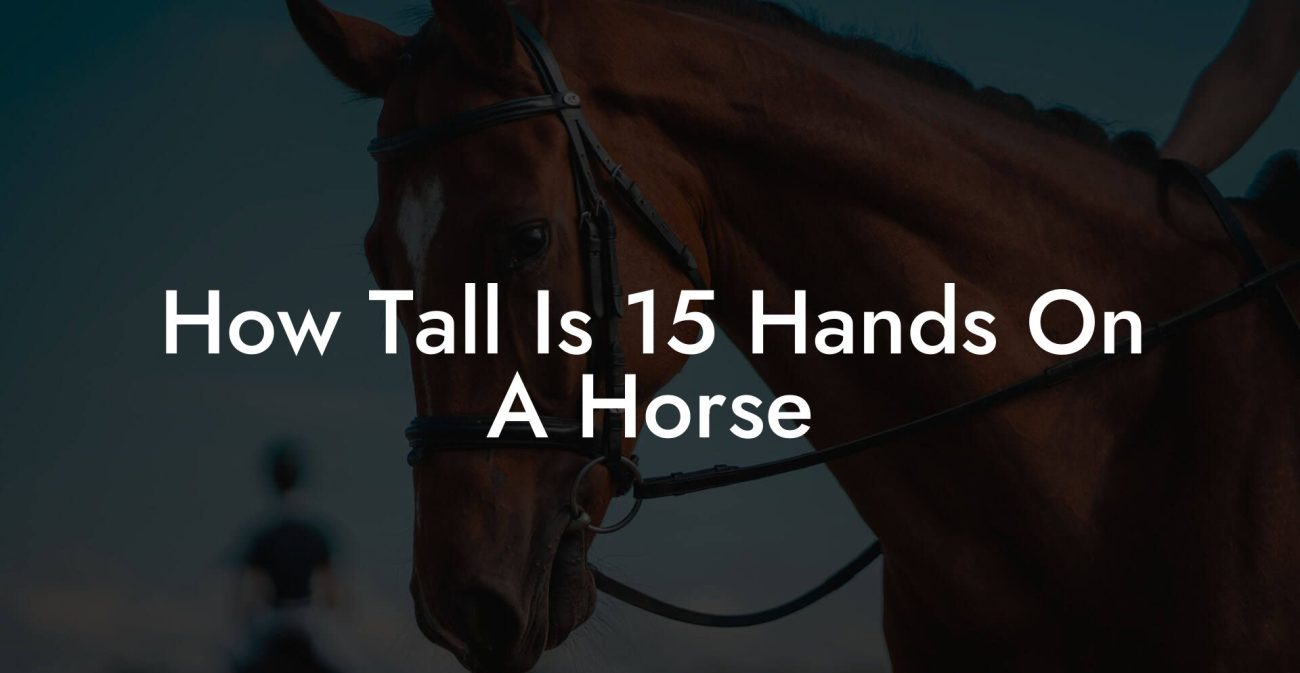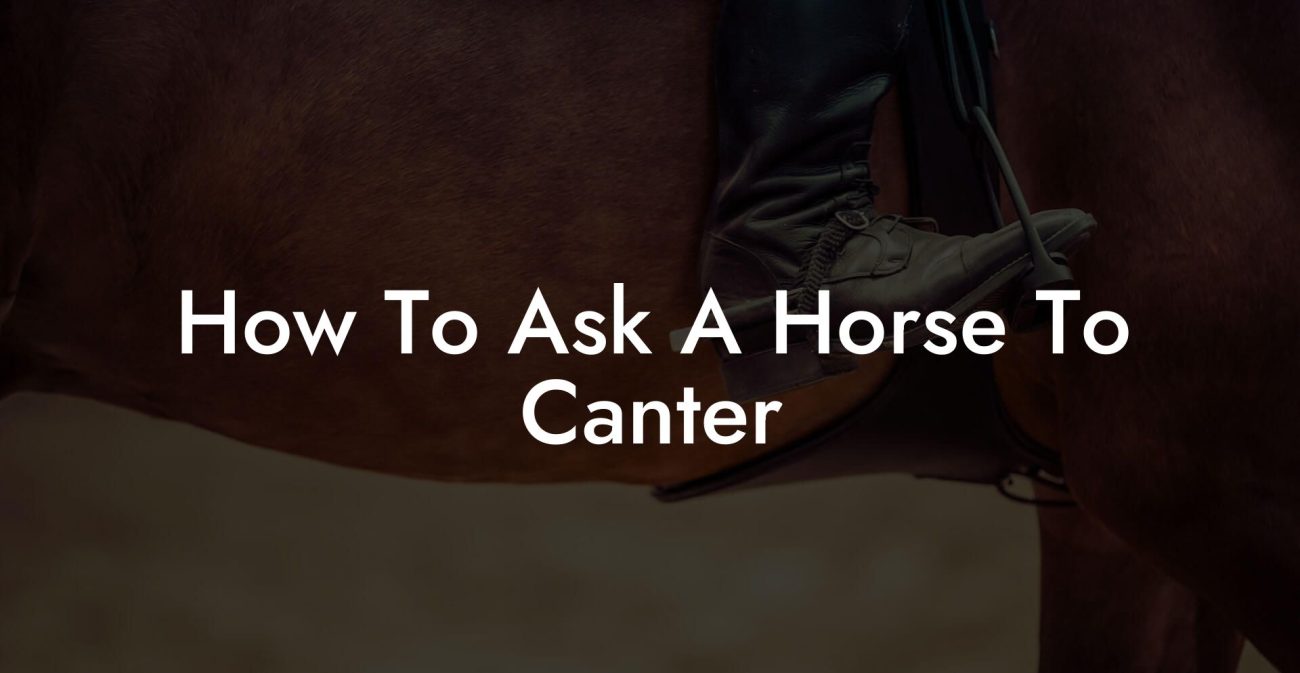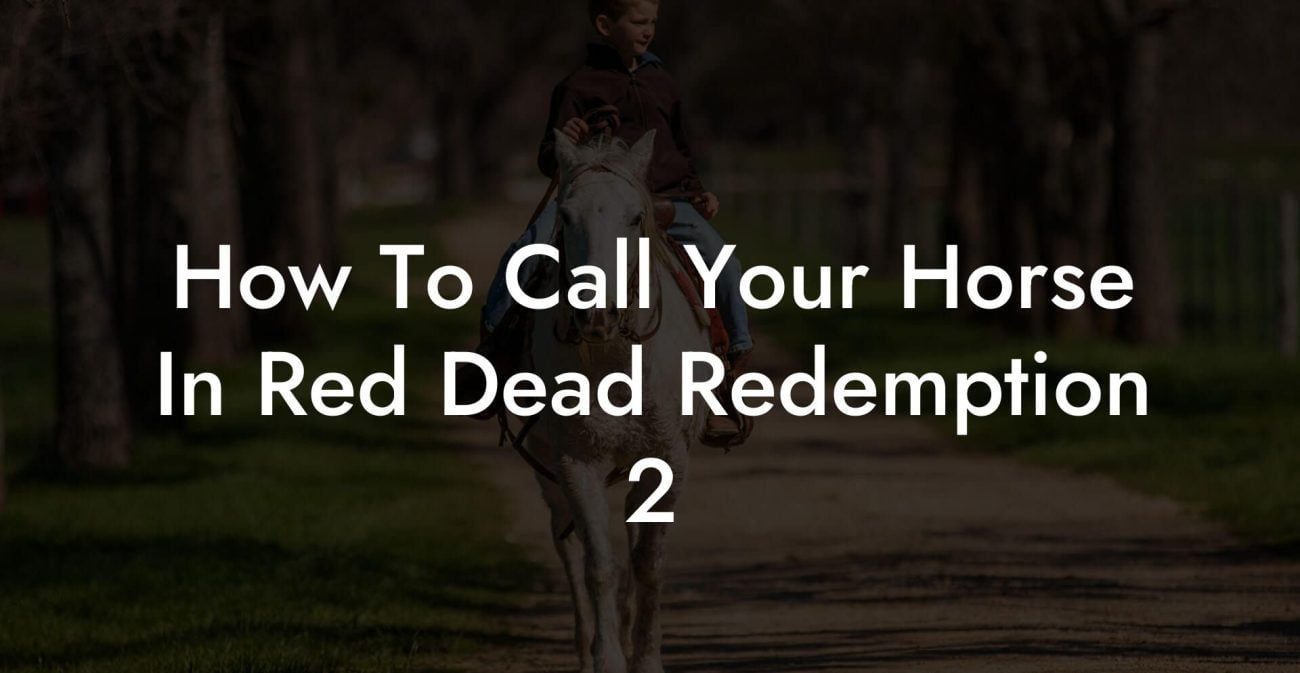Ever had that sinking feeling when you notice your horse seems a little off, their belly a bit too tense, or they're acting unusually irritable? If you’re a horse owner in the Gen-Z or millennial crowd, chances are you’ve heard the term "colic" thrown around and wondered, “What does colic mean in a horse?” Colic isn’t some trendy new horse diet or a quirky equestrian dance move, it's a serious gastrointestinal condition that can send your equine friend into a tailspin. In this deep-dive guide, we’ll unravel the mystery of colic, explore the causes, symptoms, treatments, and even holistic strategies to keep your four-legged pal happy and healthy.
Quick Links to Useful Sections
- The Lowdown on Colic: What It Really Means for Equine health
- Understanding the Causes: What Triggers Colic?
- Recognizing the Red Flags: Symptoms Every Horse Owner Should Know
- Behavioral Changes
- Physical Symptoms
- Altered Bowel Movements
- Diagnosis: The Role of Your Veterinarian in Unraveling Colic
- Treatment Strategies: Conventional Veterinary Approaches
- Medical Interventions
- Fluid Therapy
- Surgical Intervention
- Integrative and Holistic Approaches: A Modern Twist to Colic Care
- Nutritional Adjustments
- Herbal Remedies and Natural Supplements
- Acupressure and Massage Therapy
- Environment and Stress Reduction
- The Role of Diet: Fueling a Healthy Digestive System
- Forage First
- Controlled Grain Feeding
- Hydration is Key
- Supplemental Support
- Preventative Measures: Keeping Colic at Bay
- Case Studies: Real-Life Stories of Colic Recovery
- Case Study 1: The Sudden Case of “Midnight”
- Case Study 2: “Bella’s Battle” Against a Blockage
- Case Study 3: Overcoming Chronic Colic Episodes
- Resources and Community Support: Your Next Steps in Equine Care
- Crafting a Personalized Equine Care Plan: A Roadmap to Prevention and Recovery
- Holistic Recovery Techniques: Nurturing Body, Mind, and Gut
- Rest and Recuperation
- Balanced Re-Feeding
- Mindfulness in Equine Care
- riding Through Recovery: Tips for the Modern Horse Owner
- Integrative and Holistic Approaches FAQs: Your Equine Questions Answered
- Your Journey to Proactive Equine Well-Being
The Lowdown on Colic: What It Really Means for Equine health
In the world of horses, colic is a broad term used to describe abdominal pain that stems from issues within the gastrointestinal tract. Unlike a simple stomach ache, colic in horses can range from mild discomfort to a life-threatening emergency. The gut of a horse is a marvel of nature, an intricate system that requires constant balance. When something goes awry, be it a twist, a blockage, or gas buildup, the result is a condition that demands immediate attention.
If you’re new to horse care, understanding colic is essential. Being prepared, knowing the signs, and acting swiftly can mean the difference between a quick recovery and a dire situation. Whether you're an urban equestrian or a countryside rider, the welfare of your horse hinges on your ability to decode the symptoms of colic and take informed action.
Colic can be caused by a myriad of factors, from dietary mishaps to stress or even an underdeveloped gut flora. In this guide, we'll take you on a ride through the anatomy of colic, exploring everything you need to know to keep your horse out of harm's way.
Understanding the Causes: What Triggers Colic?
Just like us humans, horses can suffer from tummy troubles, but in horses, these troubles can escalate quickly into colic. There isn’t just one sneaky culprit; colic is a catch-all term that covers several gastrointestinal disturbances. Here’s a rundown of the main triggers:
- Dietary Issues: A sudden change in diet, overfeeding grain, or consuming spoiled feed can disrupt the delicate balance of the equine gut. High-grain diets, in particular, can produce excess gas or cause impaction, setting the stage for colic.
- Water Quality and Intake: Horses need adequate, clean water. Insufficient water intake can lead to dehydration, which, in turn, causes feed to compact into hard masses that can block the intestines.
- Gastrointestinal Obstructions: Objects such as sand, foreign bodies, or even excessive fibrous material can physically obstruct the gut. These blockages may require surgical intervention if conservative treatments fail.
- Gut Motility Issues: The equine digestive system depends on rhythmic contractions to move food along. Any disruption in this process, whether due to stress or an underlying condition, can lead to abnormal gas buildup and pain.
- Helminth Infestation: Parasitic worms wreak havoc on the gut lining and function. Regular deworming and fecal egg counts are critical steps in preventing colic in younger and older horses alike.
- Stress and Environmental Changes: Changes in routine, whether a new stable, long transport, or even the excitement of a competition, can tip the balance of a sensitive digestive system.
Each of these factors can work in isolation or in concert, making colic a multifaceted challenge. But don’t worry! Recognizing these causes early on is your first defense in the battle against equine colic.
Recognizing the Red Flags: Symptoms Every Horse Owner Should Know
When it comes to colic, your horse might not literally say “Ouch!” but it sure gives off signals. A keen eye and quick action are your best friends in these critical moments. Here are the top symptoms to watch for:
Behavioral Changes
One of the first signs of colic is a change in your horse's demeanor. They might become unusually restless, paw at the ground, kick at their belly, or even roll excessively in an attempt to relieve discomfort. A normally calm horse suddenly displaying anxiety or irritability is a red flag.
Physical Symptoms
Look for signs like a distended abdomen (which indicates gas buildup), sweating, and an elevated heart rate. Some horses may also exhibit a lack of appetite or show reluctance to move. If your horse refuses to eat or drink, it might be whispering that something is seriously off.
Altered Bowel Movements
Changes in manure consistency, frequency, and color can also signal colic. Diarrhea or the complete absence of a bowel movement can indicate an obstruction or severe gastrointestinal distress.
These symptoms can appear subtly at first, but they tend to escalate quickly. Always trust your instincts as a horse owner, a familiar horse acting out of character is usually a sign that something is amiss.
Diagnosis: The Role of Your Veterinarian in Unraveling Colic
When suspicion of colic arises, the clock starts ticking. A veterinarian’s expertise is crucial in diagnosing the specific type and severity of colic. Their job is to decipher the mysterious signals your horse is giving and determine the best course of action.
Upon arrival, a vet will typically perform a comprehensive physical examination. This includes checking vital signs, palpating the abdomen for any abnormal masses, and possibly using ultrasound or X-rays to get a closer look at the internal structures. Blood work and other diagnostic tests might also be needed to rule out other conditions.
Quick and accurate diagnosis not only helps in deciding the right treatment but can also be a lifesaver. The spectrum of colic from mild discomfort to severe, life-threatening pain can be vast, and having a professional on board makes all the difference.
Treatment Strategies: Conventional Veterinary Approaches
Once colic is on the table as a differential diagnosis, it's time to move into treatment mode. The good news is that many forms of colic respond well to early intervention. Here’s what you might expect from the vet’s treatment arsenal:
Medical Interventions
In less severe cases, treatment may involve medication to relieve pain and relax the intestines. Non-steroidal anti-inflammatory drugs (NSAIDs) are commonly used to ease discomfort. In addition, medications to stimulate gut motility can help restore the rhythmic contractions needed to move food along the tract.
Fluid Therapy
Dehydration can worsen colic symptoms. Intravenous fluids are often administered to rehydrate the horse and restore essential electrolyte balance. This is critical in cases where dehydration has set in due to prolonged colic.
Surgical Intervention
In cases where there is a severe obstruction, twisted gut, or any condition unresponsive to medical management, surgery becomes the procedure of choice. Although a daunting prospect, timely surgical intervention can save a horse’s life. Your vet will monitor the outcomes closely post-surgery to prevent any recurrence.
It’s important to note that while conventional treatments are highly effective, they must be applied quickly. This reinforces the importance of early detection and the invaluable role of your veterinarian.
Integrative and Holistic Approaches: A Modern Twist to Colic Care
For those of you who love a fusion of modern science and old-school natural healing (and honestly, who doesn’t appreciate a little holistic flair?), there are integrative approaches that can complement conventional treatments. While these strategies should never replace professional care, they offer additional avenues for recovery and ongoing prevention.
Nutritional Adjustments
Just as your body thrives on a balanced meal, your horse’s gut needs a steady diet of quality forage and carefully measured grains. Transitioning your horse gradually to new feeds, ensuring high-quality hay, and incorporating supplements rich in prebiotics and probiotics can foster a healthy gut environment.
Herbal Remedies and Natural Supplements
Some horse owners find that specific herbal supplements offer supportive benefits to their equine friends during digestion distress. Ingredients like slippery elm, ginger, and chamomile have been traditionally used to soothe the gut lining and reduce inflammation. Always consult your veterinarian before introducing any herbal remedies into your horse’s routine.
Acupressure and Massage Therapy
When your horse is recovering from colic, gentle massage and acupressure techniques can stimulate circulation and promote relaxation. These methods can be particularly effective in reducing stress, a known trigger for colic, and enhancing overall gastrointestinal function.
Environment and Stress Reduction
Horses are highly sensitive creatures. A calm, predictable environment minimizes stress-induced colic episodes. Incorporate regular, unhurried turnouts, maintain a consistent feeding schedule, and create a stable atmosphere to optimize your horse’s mental and physical well-being.
Integrative therapies work best when combined with conventional treatments, creating a robust, multidimensional approach to preventing and managing colic. It’s all about nurturing the whole system, body, mind, and gut.
The Role of Diet: Fueling a Healthy Digestive System
Diet is a cornerstone of equine health, and its impact on colic cannot be overstated. Think of your horse’s digestive system like a finely tuned engine, the right fuel ensures peak performance. Here’s how to keep that engine purring:
Forage First
Horses are naturally designed to graze. High-quality hay or pasture grass should make up the bulk of their diet. Forage not only provides essential fiber to help maintain gut motility but also plays a critical role in preventing the rapid fermentation that often leads to gas and impaction-type colic.
Controlled Grain Feeding
While grains are energy-rich, overfeeding or sudden diet changes can upset the microbial balance in your horse's gut. Work with your veterinarian or equine nutritionist to design a feeding plan that gradually introduces concentrates if needed, ensuring minimal disruption to your horse’s digestive system.
Hydration is Key
Just like us after a long night out, horses need proper hydration to keep everything running smoothly. Ensure your horse always has access to clean, fresh water. In colder months, consider using heated water buckets to encourage hydration.
Supplemental Support
Probiotics and prebiotics can be a game-changer, supporting the beneficial bacteria in your horse’s gut. These supplements help maintain digestive balance and reduce the risk of disturbances that could lead to colic. Consult with your vet to choose the right formula for your horse.
By taking a proactive approach to your horse’s nutrition, you significantly reduce the risk of colic, ensuring a resilient digestive system and a happier, healthier companion.
Preventative Measures: Keeping Colic at Bay
Prevention is always better than cure, especially when it comes to colic. Implementing effective strategies to minimize the risk of colic can save you from stressful emergencies and help your horse maintain a stellar quality of life. Here are some practical tips:
- Consistent Feeding Schedule: Avoid abrupt changes in diet. Implement a gradual transition when introducing new feeds.
- Regular Deworming: Follow a veterinarian-approved deworming schedule to keep parasitic infestations, one of the common culprits in colic, in check.
- Access to Clean Water: Ensure your horse always has ample fresh water. Consider checking water sources often to guard against contaminants.
- Routine Exercise and Turnout: Regular, moderate exercise can help the digestive system function smoothly. Ensure your horse has regular turnout time in a safe environment.
- Stress Management: Work to minimize stress factors by maintaining a stable environment, limiting sudden changes, and offering plenty of grazing time.
- Regular Veterinary Check-Ups: Don’t wait for a problem to arise. Proactive healthcare can quickly identify early signs of trouble, ensuring timely intervention.
Taking these preventative measures seriously not only lowers the risk of colic but also contributes to a healthier, happier life for your horse.
Case Studies: Real-Life Stories of Colic Recovery
Sometimes, real-life examples offer the best insight on how to handle challenges. Here are a few rider-approved case studies that illustrate how understanding colic and taking immediate action can transform a crisis into a comeback story.
Case Study 1: The Sudden Case of “Midnight”
Midnight, a spirited gelding known for his midnight runs around the pasture, suddenly became lethargic one brisk autumn morning. His owner noticed that Midnight was pawing at the ground, rolling, and had a bloated appearance. Recognizing the early signs of colic, she immediately contacted their trusted veterinarian. Quick diagnostics revealed a mild gas colic caused by a miscalculated feeding schedule during a recent diet change. With prompt medical treatment, fluid therapy, and carefully monitored rest, Midnight bounced back in a matter of hours, his usual energy restored. This case underscores the importance of gradual diet changes and proper hydration.
Case Study 2: “Bella’s Battle” Against a Blockage
Bella, a gentle mare with a love for long trail rides, experienced a severe bout of colic triggered by an intestinal impaction. Her owner immediately noticed Bella’s refusal to eat and her increasing discomfort, marked by heavy sweating and restlessness. After a thorough examination, a blockage was identified. Bella underwent emergency surgery, followed by intensive post-operative care including a blend of conventional and holistic interventions. Over the next few weeks, Bella’s recovery was supported by a carefully planned diet, gentle massage, and stress-reducing measures. Today, she’s back to her playful self, proving that a multifaceted approach can work wonders.
Case Study 3: Overcoming Chronic Colic Episodes
In a particularly challenging scenario, a horse named Rocky had been plagued by recurrent colic episodes over several months. His owner, determined to find a lasting solution, worked hand-in-hoof with their vet to overhaul his diet, introduce probiotics, and create a more consistent feeding schedule. Additionally, they integrated daily turnout and low-intensity exercise to boost gut motility naturally. These combined conventional and holistic interventions gradually reduced the frequency of Rocky’s colic bouts until they diminished altogether. Rocky’s story is a testament to the efficacy of long-term, preventive strategies and the power of consistency.
Every case is a reminder that colic is not a one-size-fits-all condition. Whether it’s a sudden episode or a chronic challenge, attentive care, prompt professional intervention, and a well-rounded approach to prevention can make all the difference.
Resources and Community Support: Your Next Steps in Equine Care
Navigating the complexities of colic may feel overwhelming at times, but remember, you're not alone on this journey. Today's horse care community is vibrant, supportive, and resource-rich. Engage with online forums, local equestrian clubs, and social media groups where fellow horse owners and professionals share valuable insights, personal experiences, and practical tips.
Veterinary schools, equine nutritionists, and certified trainers often run workshops that delve into holistic and conventional strategies for colic management. These resources not only broaden your knowledge but also connect you with experts who can provide personalized advice tailored to your horse’s unique needs.
Additionally, many state and national equine organizations offer hotlines, emergency protocols, and even telemedicine consultations to aid in urgent situations. Make it a habit to bookmark a few trusted resources and keep contact details for your local veterinary clinic handy, these simple steps can save valuable time during emergencies.
As you continue your journey in equine care, advocate for proactive learning and community engagement. Empower yourself with the latest research, practical tools, and a network of support that reinforces the importance of both conventional wisdom and innovative, holistic approaches.
Crafting a Personalized Equine Care Plan: A Roadmap to Prevention and Recovery
Developing a tailored care plan for your horse is a proactive step towards staving off colic and ensuring long-term wellness. Start by scheduling regular veterinary check-ups to monitor your horse’s overall health and digestive function. Use these appointments to discuss dietary changes, stress factors, and any minor signs of discomfort that could escalate.
Your personalized plan might include:
- A Balanced Diet: Emphasize high-quality hay, introduce grains gradually, and incorporate fiber-rich supplements to promote optimal gut motility.
- Structured Exercise Regimes: Regular, low-intensity workouts not only maintain physical fitness but also enhance digestive function, reducing constipation risks.
- Stress-Reduction Techniques: Ensure your horse enjoys ample turnout time, consistent routines, and a supportive social environment with other horses.
- Regular Monitoring: Keep track of manure consistency, water intake, and behavioral changes, using a digital log or equine health app to monitor trends and catch early warning signs.
- Integrative Support: Explore complementary therapies like gentle massage or acupressure sessions to offer additional relief and reinforce overall digestive health.
Consistency is king. Establish a routine that seamlessly incorporates these elements into your horse’s daily life. Over time, you’ll not only mitigate the risk of colic but also foster a more resilient and happy horse.
In teaming up with your veterinarian and tapping into equine community wisdom, you create a living care plan that adapts as your horse ages or as new challenges emerge. Remember, a personalized approach is your best defense against the unpredictable nature of colic.
Holistic Recovery Techniques: Nurturing Body, Mind, and Gut
Recovery from a colic episode is more than just returning to a normal feeding schedule, it's about restoring balance throughout your horse’s entire system. A holistic recovery program considers physical healing, mental calm, and nutritional repair.
Rest and Recuperation
After a colic episode, giving your horse time to rest is crucial. Limit strenuous activity and ensure they have a quiet, stress-free environment where their body can recover. Post-surgical or severe colic cases may require an extended period of downtime, monitor their progress and slowly reintroduce gentle exercise.
Balanced Re-Feeding
During recovery, gradually reintroduce feed to prevent overwhelming the digestive system. Start with easily digestible, fibrous materials to soothe the gut, and slowly add in other elements as your horse regains strength.
Mindfulness in Equine Care
While your horse may not meditate on a mountaintop, managing their environment to reduce anxiety is key. Soft lighting, calming music from nature sounds, and regular human interaction can all play a role in soothing nerves and preventing stress-induced colic episodes.
Integrating these holistic recovery techniques with conventional veterinary post-treatment protocols can accelerate healing and lay a strong foundation against future colic occurrences.
riding Through Recovery: Tips for the Modern Horse Owner
In today’s fast-paced, digitally connected world, managing the well-being of your horse can feel like juggling apps on your phone. Whether you're riding through your daily commute or spending quality time in the countryside, here are some down-to-earth tips to guard against colic:
- Keep a Digital Log: Use an app or simple digital journal to record feeding times, water intake, and any concerning behavior. Early detection is easier when you have a comprehensive record.
- Stay Informed: Follow reputable equine health blogs, join social media groups, and subscribe to newsletters. The more you know, the better equipped you are to handle emergencies.
- Build a Relationship with Your Vet: Regular communication with your veterinarian builds trust and ensures that you’re prepared for any eventuality, even if colic strikes out of the blue.
- Embrace Preventive Care: Incorporate regular deworming, annual dental checks, and well-planned feeding schedules. These proactive measures lay a robust foundation for your horse’s overall digestive health.
- Customize Your Stable Environment: A stress-free stable with routine, clean water, and accessible forage minimizes the risk of sudden diet changes that could upset the gut.
Combining modern digital tools with tried-and-true equine care principles creates a formidable defense against the threat of colic. A well-informed owner is a confident owner, and a happy horse is the ultimate reward.
Integrative and Holistic Approaches FAQs: Your Equine Questions Answered
Let’s wrap up with some of the most common questions horse owners have about colic, its management, and how integrative approaches can bolster conventional treatments.
1. What exactly is colic in horses?
Colic is a broad term that describes abdominal pain in horses, generally caused by issues within the gastrointestinal tract such as gas buildup, impaction, or obstructions.
2. How can I quickly recognize the signs of colic?
Look for changes in behavior such as restlessness, pawing, rolling, lack of appetite, or altered bowel movements. An unusually tense abdomen or rapid heartbeat can also be warning signs.
3. When should I call the veterinarian?
If you notice any symptoms of colic, even the mildest signs, contact your veterinarian immediately. Early intervention is critical to avoid a potentially life-threatening situation.
4. What are the most effective conventional treatments for colic?
Treatment options range from pain-relieving medications and fluid therapy to, in severe cases, surgical intervention. The specific treatment depends on the cause and severity of the colic.
5. Can holistic approaches help in preventing colic?
Absolutely. Proper nutrition, stress reduction, controlled dietary changes, and integrative therapies such as herbal supplements can support a healthy gut and reduce the risk of colic.
6. How do I safely transition my horse’s diet to avoid colic?
Any dietary change should be gradual. Mix small amounts of the new feed with the old, gradually increasing the proportion over a period of 7-10 days while monitoring your horse closely.
7. Are there any preventive supplements I should consider?
Probiotics and prebiotics can be beneficial. They help maintain a balanced gut flora, which is essential for preventing digestive upsets. Consult with your vet for the best options.
8. Is environmental stress a major factor in colic?
Yes, stress is a significant contributor. Horses thrive on routine and a stable environment. Minimizing stress through a well-organized stable and regular turnout can help guard against colic.
9. Can I rely solely on holistic therapies if my horse experiences colic?
No. Integrative approaches should complement, not replace, conventional veterinary care, especially during emergencies. Always seek professional guidance.
10. How important are regular vet check-ups in preventing colic?
Regular veterinary examinations are essential. They help catch potential issues early and allow for timely interventions, significantly reducing the risk of severe colic episodes.
Your Journey to Proactive Equine Well-Being
Caring for your horse is an adventure, a blend of science, intuition, and a whole lot of heart. Understanding what colic means in your horse’s life is a crucial piece of the puzzle. It’s not just about reacting to crises, but also about creating an environment where preventive care, balanced nutrition, and stress-free daily routines harmonize to keep your horse galloping gracefully.
Whether you’re a seasoned rider or a new enthusiast just embarking on your equine journey, remember that every small step toward understanding and prevention makes a world of difference. Equip yourself with knowledge, build connections with veterinarians and fellow horse lovers, and don’t hesitate to integrate both conventional and holistic approaches in your daily care routine.
Your proactive approach and care are the keys to ensuring that when colic does rear its head, you’re ready with the right tools and insight to help your horse bounce back. Embrace every resource, every tip, and every shared success story as part of your roadmap to empowered, proactive equine well-being.
So, saddle up and let your horse’s health be a testament to your dedication, blending modern science with time-tested care methods. Your horse’s gallop into a healthier future starts with the informed decisions you make today, here’s to many more trails ridden with confidence!

